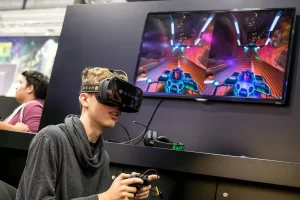
In recent years, quantum computing has emerged as a groundbreaking technology with the potential to revolutionize various industries. One such industry that stands to benefit greatly from the power of quantum computing is game development. With quantum computers offering unprecedented computing capabilities, game developers are exploring exciting possibilities to enhance game mechanics, create more immersive virtual worlds, and push the boundaries of what is possible in gaming. In this article, we will delve into the role of quantum computing in game development and explore the potential it holds for shaping the future of the gaming industry.
Quantum Simulations for Realistic Gaming Environments
Quantum computing’s immense processing power can pave the way for highly realistic gaming environments. By harnessing the quantum power, developers can create complex simulations that accurately capture the physics and dynamics of the real world. From realistic rendering of fluid dynamics to advanced physics calculations, quantum simulations can enable game worlds that feel incredibly lifelike and immersive.
Advanced Artificial Intelligence and NPCs
Quantum computing can also introduce significant advancements in the field of artificial intelligence (AI) within gaming. With quantum machines, game developers can create more intelligent Non-Player Characters (NPCs) that exhibit behavior and decision-making capabilities far beyond what is currently possible. These NPCs can adapt dynamically to player actions, learn from their experiences, and offer a truly realistic and challenging gaming experience. The utilization of quantum computing in AI can pave the way for gaming experiences with more lifelike interactions and responsive virtual characters.
Optimized Multiplayer Experiences
Quantum computing can greatly enhance the multiplayer gaming experience. By leveraging quantum algorithms, developers can optimize complex matchmaking systems, ensuring fair and efficient connections between players. Quantum computing’s speed and efficiency can facilitate real-time analysis of player skill levels, game preferences, and other factors to create highly personalized and enjoyable multiplayer experiences.
Improved Virtual Reality (VR) and Augmented Reality (AR)
Virtual Reality (VR) and Augmented Reality (AR) technologies have gained significant popularity in gaming. Quantum computing holds immense promise for improving these technologies by enabling faster and more accurate rendering, reducing latency, and enhancing overall performance. The quantum power can help overcome the current limitations of VR and AR, unlocking new levels of immersion and realism for players.
Complex Game Design and Balancing
Quantum computing can revolutionize the game design process by simplifying and accelerating complex calculations. With quantum algorithms, developers can tackle complicated optimization problems, improve game balancing, and fine-tune parameters to ensure a satisfying gaming experience. By leveraging near-instantaneous processing capabilities, quantum computing enables developers to iterate and experiment with game mechanics more efficiently, leading to more engaging and enjoyable games.
Challenges and Future Outlook
While the potential benefits of quantum computing in game development are undeniable, there are also challenges to overcome. One significant hurdle is the practical implementation of quantum computers into mainstream game development workflows. The technology is still in its early stages, and widespread adoption may take time.
However, as quantum computing continues to evolve, so does its potential to shape the gaming industry. With increasing accessibility and advancements, quantum computing may soon become an integral part of game development. The future holds the promise of games that are visually stunning, highly interactive, and offer unparalleled experiences for players.
Conclusion
Quantum computing represents a game-changer for the gaming industry. Embracing this revolutionary technology opens up a world of possibilities for developers to create more realistic environments, enhance AI capabilities, optimize multiplayer experiences, improve VR and AR technologies, and refine game design. Although implementation challenges exist, the future outlook for quantum computing in game development is incredibly promising. As quantum computers become more prevalent, we can expect a new era of gaming where boundaries are pushed, and virtual worlds become even more compelling and immersive than ever before.


